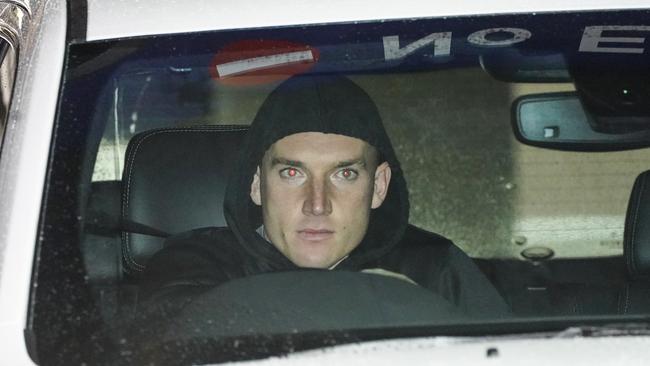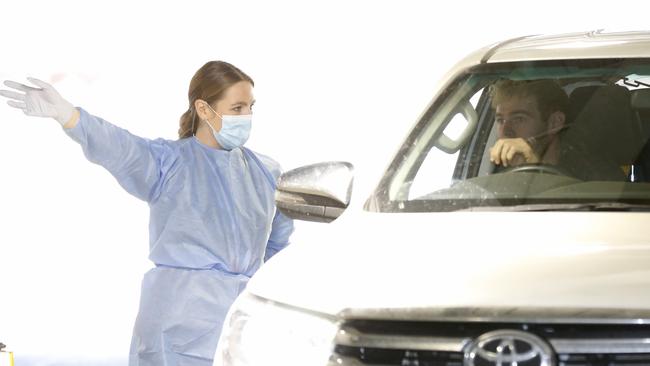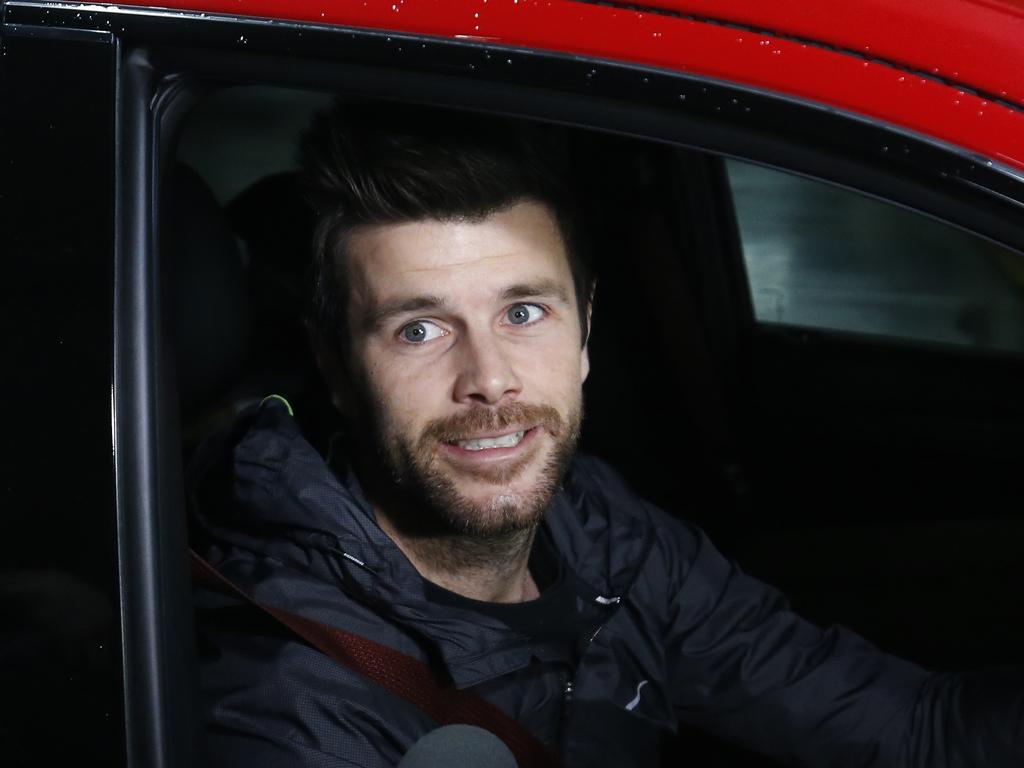SA kills off quick return for AFL
South Australia decides not to exempt players from a 14-day quarantine throwing the season into further disarray.

The AFL will be forced to relocate Adelaide and Port Adelaide to an interstate hub to save the 2020 season after the South Australian government refused to waive its 14-day coronavirus quarantine rules for players.
The coronavirus-hit season has been thrown into further disarray by the dramatic decision on Wednesday night by South Australia’s Chief Medical Officer Nicola Spurrier and Police Commissioner Grant Stevens not to exempt AFL players.
In a letter to AFL chief Gillon McLachlan, they said the AFL should not be allowed to operate by different standards to the rest of the SA community, adding the AFL’s plans posed “an unnecessary public health risk”.
Dr Spurrier and the commissioner said SA did not want to compromise its strong performance in suppressing the coronavirus, with the state having recorded almost three weeks with just one new infection.
The state’s hardline stance means the only way the season can resume is for the Crows and Power to be relocated interstate. However, The Australian understands that neither Port Adelaide nor the Adelaide Crows are likely to support that option on the basis of player unease about spending an entire, if truncated, season interstate.
The SA letter, sent last night and obtained by The Australian, says the AFL’s plans were considered but rejected.
“On public health advice, the committee has resolved that any economic and social benefits to be gained by allowing modification or exemptions to SA quarantine requirements for AFL payers were not outweighed by the public health risk,” the letter states.
“In addition to a modification or exemption being considered an unnecessary public health risk in SA, the committee noted that as a highly visible part of society it is also important that the AFL model the behaviours expected from the public in general. The risk complacency within the wider community rises if it is (seen) that these measures have diminished in importance.”
The Wednesday twist has further complicated attempts to have football return by mid-June.
As Dusty Martin and his Tiger teammates lined up in their SUVs at the COVID-19 drive-through on Wednesday, Jeff Kennett was laying out a three-step rescue plan and Eddie McGuire was stressing century-old club rivalries were being put aside to save footy.
The tense coast-to-coast struggle to save the AFL in 2020 — and beyond — brings together some of the biggest names in sport, business and politics in a frantic search for a federated solution to win the tick of approval from premiers and chief health officers.
Hawthorn president Mr Kennett, a former Victorian premier, identified three steps to get footy back by mid-June.
The first was the urgent rollout of uniform training rules across all states to allow contact drills and full-team exercises. The second was to either persuade the premiers of WA and SA to agree to loosen border controls for AFL players, or get Fremantle, West Coast, Adelaide and Port Adelaide to relocate east.
The third was to lock in a “hard cap” on club spending for football departments, including assistant coaches and fitness staff.
“Getting players able to train together — hard training, body-on-body training — is so important,” Mr Kennett said on Wednesday. “The teams need to get back training together for three, maybe four weeks, of hard training.”
Mr Kennett and Mr McGuire are seconded to the AFL’s “virus crisis” cabinet working closely with AFL chief McLachlan to not only save the 2020 season, but prevent some clubs from going broke.
The AFL’s preferred fly-in, fly-out strategy is designed around minimising the exposure of players to infection with a strict bus-flight-venue travel itinerary.
However, if Western Australia maintains its hardline stance on border restrictions — for which Premier Mark McGowan has strong community support — the commission is said to be fully supportive of West Coast and Fremantle Dockers players moving into an interstate hub.
Mr McGowan, who says border controls are “the last thing to come down”, and SA Premier Steven Marshall have held the line to date, refusing to offer exemptions for the AFL to 14-day isolation rules.
One option with strong support within the Eagles would be to resume the season with a West Coast-Fremantle derby in Perth, then moving the WA clubs to the Gold Coast.
Mr McGuire — Collingwood president, businessman and commentator — said that although there had been public flashes of controversy, it was evident the AFL industry was working to provide a level playing field.
“We have played the cards that have been dealt. If we go into meetings with a sense of individualism … or talking yourself up or trying to stitch someone else up, that is never going to work,” he told The Australian.

“For the game to get back up and going, everyone lays their guns down and gets to it. There is no point lying in bed at night wondering, ‘what if?’ ”
McLachlan is a master negotiator and has a star-studded AFL Commission, led by Qantas chairman Richard Goyder, by his side.
As one source close to the commission put it this week: “We have to work with the states, not against them. We are trying hard to find an answer that works. There will be a path forward.”
Hoody-wearing Dusty Martin drove to Marvel Stadium on Wednesday along with Richmond teammates as part of a compulsory testing of more than 1000 AFL players and officials.
It was “not very pleasant”, but Richmond captain Trent Cotchin knew it would be a vital step to getting football back. Cotchin, 30, was one of about 250 players and officials who were swabbed at a pop-up coronavirus testing facility at the stadium.
Mr McGuire said the football codes had made massive ground in just two months, going from the position where it appeared impossible for the season to occur to being on the verge of playing and training.
“Clearly the AFL and the NRL and other codes, but those two are the big codes, they have a huge role to play in society. You even take for granted how important something small like footy tipping can be when it comes to social integration,” he said.
In Victoria, players are allowed full contact training and can train as an entire club provided strict guidelines are followed. In NSW, players are allowed to train with full contact while abiding by protocols in relation to minimising time spent at clubs.
In Queensland, players are allowed to train with full contact, spend as little time at the clubs as possible and are required to have received a flu injection. In SA, players are not allowed to train in groups of more than 10. Social-distancing guidelines must be followed. Sharing equipment should be avoided.
In WA, from Monday, groups of up to 20 can train and social-distancing guidelines remain in place. Sharing equipment should be avoided.
SA’s Wednesday-night letter made it clear there would be no early return to mass training before June 8, in line with the same rules that apply for the rest of the community under the government’s road map out of lockdown.
“To be fair and equitable, that means no one can train in teams. But before we can resume the seasons, the players must be able to train together,” Mr Kennett said.
He said he was confident AFL games, without crowds, could resume in mid-June.





To join the conversation, please log in. Don't have an account? Register
Join the conversation, you are commenting as Logout